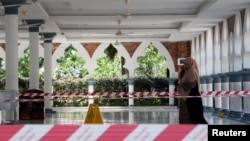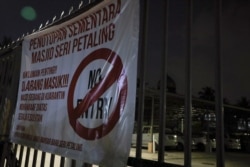Organizers of a Muslim missionary event in Indonesia on Wednesday agreed to disperse more than 8,000 attendees who had gathered for a five-day event even as governments worldwide attempted to slow the spread of the coronavirus by limiting the size of public gatherings or canceling them.
People began arriving in the Gowa district of South Sulawesi over the weekend for the World Meeting of Asian Zone Muslims at the Darul Ulum Islamic school. The attendees included about 400 people from outside Indonesia.
The event was organized by Tablighi Jamaat, a Muslim missionary group that hosted an event for 16,000 people in Malaysia’s capital, Kuala Lumpur, from Feb. 27 to March 1. The Malaysian event has emerged as a coronavirus transmission hub for dozens of confirmed cases throughout Southeast Asia after attendees sat knee-to-knee and shared meals at the Sri Petaling mosque.
Indonesia’s head of the Task Force for Accelerated Management of COVID-19, Lt. Gen. TNI Doni Monardo, told VOA that he was trying to stop further mass gatherings.
Elsewhere, they are discouraged if not banned. For example, in a guidance announcement issued Sunday, the U.S. Centers for Disease Control and Prevention advised against gatherings of 50 people or more for the next eight weeks.
Event suspended
On Wednesday night, Gowa District head Adnan Purichta Ichsan told VOA Indonesia that initially he had tried, and failed, to persuade the organizers to postpone the event.
“Trying to disperse those who had come, numbering some 8,000 people, would be impossible, as this is a religious event and could raise sensitive issues,” he said.
Hours later, organizers relented. Adnan told VOA via text message, “Alhamdulillah [Thank God], the committee agreed to suspend the implementation of the event.”
Until travel arrangements for the attendees are finalized, they will remain in packed tents near the event site. Adnan said the organizing committee had agreed to allow his team to spray the area with disinfectant “as a preventative measure so the people of Gowa and others are not worried.”
Based on information gathered by VOA from various sources, the attendees came from the island of Sulawesi and Central Java, a province in the middle of Java in Indonesia, with others coming from Pakistan, India, Malaysia, Thailand, Brunei Darussalam, Timor Leste, Bangladesh, the Philippines and Saudi Arabia. The people who traveled to the event from outside Indonesia arrived via Makassar. With a population of 1.3 million in 2010, Makassar is the largest city in eastern Indonesia and the capital of South Sulawesi, a province with close to 9 million residents.
Police in South Sulawesi said they did not issue a permit for the event but were limited in what they could do to prevent or disband it.
Avoid mass gatherings
The Gowa District event came two weeks after the leading Muslim organization in the world’s most populous Muslim nation, the Indonesian Ulama Council (MUI), issued an order for Muslims in Indonesia to avoid mass gatherings.
"The virus spreads fast and is hard to detect, so we'd do better to postpone public events, especially large ones where the crowd can number in the hundreds. Other countries have canceled football games and concerts. Even in Iran, they've decided not to hold the Friday prayer congregation," Muhyiddin Junaidi, MUI's deputy chairman, was quoted as saying in the Jakarta Globe on March 3.
Since then, Muslims leaders have told Indonesians to pray at home, even on Fridays, rather than gathering in mosques.
Christian events
Two Christian mass events are scheduled in Indonesia. On Flores island, the installation of Siprianus Hormat as bishop of Ruteng had been long anticipated. The archbishop of Jakarta, Ignatius Suharyo, told VOA by text message that he had attended the installation, but he refused to comment when asked if such a gathering could contribute to the spread of COVID-19.
In Larantuka, the capital of eastern Flores, the Semana Santa, an annual event, is scheduled for the week before Easter. This year Easter falls on April 12. The event is usually attended by thousands. As of this week, the event has not been canceled, but authorities are saying they will restrict the admission of outsiders to the internationally known event.
Links to a dozen cases
The Kuala Lumpur gathering organized by Tablighi Jamaat is connected to at least a dozen cases in Malaysia, that country’s Health Ministry announced last week.
Earlier this week, Cambodian health authorities announced five cases linked to the gathering.
Vietnam’s Ho Chi Minh Center for Disease Control issued an urgent announcement asking people who participated in the event to contact the local clinics or call the Health Ministry’s hotline to receive relevant guidance, according to Tuoi Tre Online. According to the news outlet, at least one person who attended the Malaysian event has been receiving treatment at the Ninh Thuan Province Hospital.
The Tablighi Jamaat gathering in Kuala Lumpur is not the only religious event linked to the spread of COVID-19. Thousands of cases in South Korea are linked to the Shincheonji Church of Jesus in Degu.





